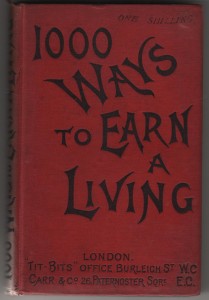 As most people know, 1888 was the year in which ‘Jack the Ripper’ committed his heinous crimes. It has been argued that the murderer was a trained surgeon , and under the heading ‘ Medicine’ in A Thousand Ways to Earn a Living ( Tit Bits Offices, 1888) we learn that a naval surgeon could earn from 11 – 17 shillings per day, while weekly pay for a police constable in London started at 28 shillings.
As most people know, 1888 was the year in which ‘Jack the Ripper’ committed his heinous crimes. It has been argued that the murderer was a trained surgeon , and under the heading ‘ Medicine’ in A Thousand Ways to Earn a Living ( Tit Bits Offices, 1888) we learn that a naval surgeon could earn from 11 – 17 shillings per day, while weekly pay for a police constable in London started at 28 shillings.
Predictably, the pay structure for members of the ‘oldest profession ‘is not included, although a typical’ lady of the night’ in the East End probably earned more in a week than would an average jobbing actress, whose wages as a ‘super’ in a theatre (the equivalent today of an Assistant Stage Manager) according to the Guide, would be between 10 and 15 shillings a week. Having worked herself up to the top of her profession, via elocution lessons and the inevitable casting couch, a budding Lily Langtry might earn as much as £30 or £40 a week. And all this before the era of Cinema and TV!
As for those who reported the murders and printed the newspapers, pay rates were also surprisingly good. A reporter on a London ‘ daily ‘ could earn anything from £3 to £7 a week, while a sub-editor’s pay might be between £5 and £16. However, a leader writer on a London paper could command £500 to £1,600 per annum and an editor from £500 to £2,000.
Newspaper printers in or around Fleet Street were among the highest paid skilled workers. At the top of the tree were the compositors, who might be paid up to £3 a week. Machinery-room men could earn from £1 to 35 shillings. The unskilled tasks, however, paid considerably less. The boys who removed the type and replaced it only got around 8 shillings a week. The Guide also informs us that in Paddington, the Victoria Press was run entirely by women. In 1888 women were also at the head of the emerging journalistic aid of typewriting. At the School for typists at Austin Friars Madame Monchablon charged her students two guineas ‘until perfect’. [R.M.Healey]
